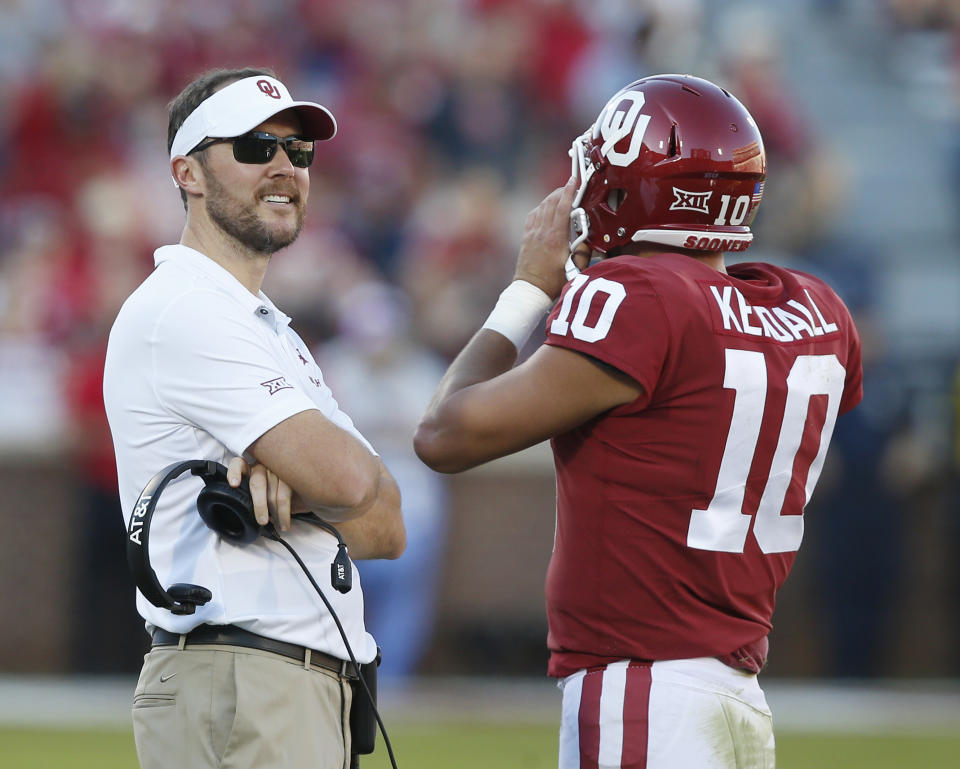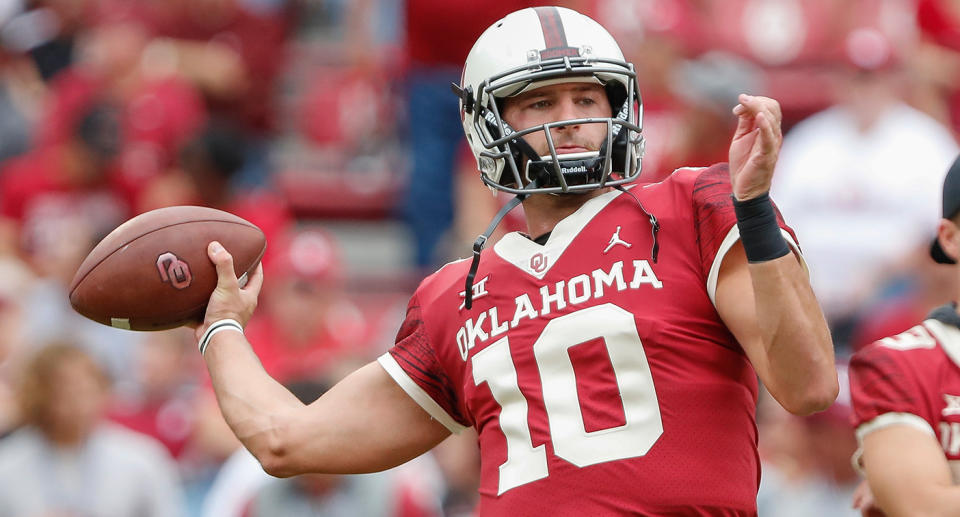Oklahoma's hypocrisy laid out in full view with shameless Austin Kendall decision
(Editor’s note: Sources told Yahoo Sports late Wednesday that Austin Kendall’s family has been informed by Oklahoma coach Lincoln Riley that he’s free to transfer without sitting out. USA Today reported that Oklahoma “worked through its concerns over a transfer within the Big 12 to arrive at the decision.” The story below was published prior to Oklahoma relenting to pressure and granting Kendall a waiver.)
In recent years, universities that attempt to place limits on athlete transfers have been shamed out of it with increasing frequency. Public tolerance for such controlling impulses has all but vanished.
But in the face of that trend, Oklahoma remained unapologetically shameless.
On Wednesday, the very day when the Sooners welcomed yet another transfer quarterback to Norman, sources confirmed to Yahoo Sports that the school was standing by the Big 12 rule that would prohibit QB Austin Kendall from gaining immediate eligibility at another conference member as a graduate transfer. The school in question is West Virginia, which is in acute need of a quarterback with Will Grier headed to the NFL.
In no just world should a school or conference have the power to tell a student where he can or cannot go. Especially a graduate student, who has fulfilled the core purpose of higher education by earning an undergraduate degree. It doesn’t matter whether that player wants to attend the school’s biggest rival — he should be free to do so.
That is a level of institutional control that simply shouldn’t exist in modern college sports. But it does, and the hypocrisy emanating from Oklahoma takes this particular situation to an even more odious level.
Let’s look at that school’s recent quarterback history. The starter from 2015-17 was Baker Mayfield, who transferred to Oklahoma from fellow Big 12 member Texas Tech. Mayfield sat out the 2014 season as a transfer and then became a star for the Sooners. But he never would have had a 2017 season — when he won the Heisman Trophy and led the team to the College Football Playoff — if not for a Big 12 rule change the year before.

Under existing conference rules, Mayfield would have lost that fifth year of eligibility due to transferring within the conference. Oklahoma lobbied for a rule change that would not strip Mayfield of his extra year, since he was a walk-on at Tech. The proposed new rule originally was voted down by the league at its spring meetings in June 2016, but Oklahoma persisted and a slightly different version was passed the next day.
Among the Oklahoma comments that day, after the amended rule passed and Mayfield was granted a fifth year:
“It was the right thing to do,” said then-coach Bob Stoops.
“With student-athlete welfare always on the front of our minds, today’s decision was the appropriate one,” said athletic director Joe Castiglione, who did not return a phone message from Yahoo Sports on Wednesday.
Given the Kendall stance, Oklahoma now appears highly selective in regard to what is the “right thing to do” and “student-athlete welfare.” Program welfare appears much more important than student-athlete welfare.
Mayfield’s shoes were filled last year by Kyler Murray, who transferred from Texas A&M and moved ahead of Kendall on the Oklahoma depth chart. Murray went on to win the Heisman as well.
And now comes Jalen Hurts from Alabama, riding in as a grad transfer to once again shove Kendall back down the depth chart. Hurts is immediately eligible at Oklahoma, as he should be. He also could have been immediately eligible at any Southeastern Conference school — even Auburn, Alabama’s bitter rival — because the league changed its rule to get in step with both modern times and common decency.
Yet even now, having recruited transfers over Kendall twice and having tacitly told him he’s not good enough to start at Oklahoma, the school is telling him he’s too valuable to allow an unencumbered transfer to another Big 12 school.
“It’s a little bit disingenuous,” said a Big 12 source. “Two years ago they were fighting for Baker Mayfield to get a waiver. They fought for him and got that waiver. They’re not willing to do it for Austin.”
It’s an appalling stance to take.
Kendall was recruited in high school by new West Virginia coach Neal Brown, who at the time was an assistant at Kentucky. Brown coached Kendall’s older brother, Ryan, a walk-on wide receiver for the Wildcats, in 2014 before Brown left for the head-coaching job at Troy the next year.
So there is an established relationship between Brown and the Kendall family. And the opportunity for immediate playing time. But because of conference affiliation and Oklahoma’s intransigence, West Virginia will have to file an NCAA waiver seeking immediate eligibility if Austin Kendall comes to school there. (Indications are that WVU would do exactly that.)

Attempting to obstruct his immediate eligibility at West Virginia is both petty and short-sighted. Is Oklahoma really afraid of what a guy who has thrown 39 collegiate passes can do for a program the Sooners have beaten every single year since it joined the Big 12?
(If Oklahoma needs to be shown how this is done, Kansas State is reportedly choosing not to block QB Alex Delton’s transfer to fellow Big 12 member TCU. Delton will be eligible to play for the Horned Frogs next season.)
This situation is reminiscent of Michigan basketball blocking guard Spike Albrecht’s attempted transfer to fellow Big Ten school Purdue in 2016. The Wolverines made it clear that they had recruited over Albrecht, anticipating his graduation, and that his fifth year might as well be spent elsewhere — until the guard wanted to stay within the conference. Then it became a problem.
At the time, Michigan coach John Beilein made the argument that there were more than 300 other schools where Albrecht was free to go. Oklahoma fans have said the same thing about the Kendall situation — he has 120 other options, among 130 FBS schools. But he should have 129, not 120.
Widespread backlash led Beilein to quickly and smartly change course and drop any restriction to Albrecht’s transfer. Lo and behold, that decision didn’t harm the Wolverines in the slightest.
Michigan beat Purdue twice in the 2016-17 season and advanced to the NCAA tournament Sweet 16 as a No. 7 seed. Last year the Wolverines went to the Final Four. This year they’re one of two remaining unbeaten teams. Letting Spike Albrecht do what he wanted to do changed nothing about the trajectory of Michigan basketball.
Austin Kendall gaining immediate eligibility at West Virginia is unlikely to do fundamental harm to almighty Oklahoma football. And even if it did, the Sooners should have no right to impede him. It’s a shameless move, in a time when athletic departments should know and act better.
More from Yahoo Sports:
• Report: Tourney nixes Ball’s team after $10K request
• Bob Costas announces his NBC career is over
• Deion Sanders has some advice for Heisman winner
• ’96 World Series MVP charged with child sex abuse

 Yahoo Sports
Yahoo Sports 